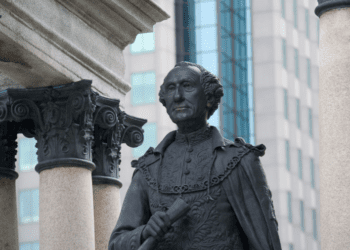Munk Senior Fellow Alastair Gillespie, who leads the MLI Confederation Project, explores how leading statesmen from 1865 articulate the political challenges they grappled with. This one looks at Sir John A. Macdonald.
By Alastair C. F. Gillespie, February 4, 2015
Warning the opportunity might never come again, John A. Macdonald today asked the legislative assembly to adopt the Quebec resolutions as the basis for federally uniting as one nation the five colonies of British North America. Doing so, he set himself a double task: first, to justify his unexpected coalition government and late conversion to the cause of federation, second, to lay the merits of the new constitution before the people. Macdonald opens a week-long barrage by the key coalition ministers including Cartier, Galt, Brown and McGee.
Canada has been in a dangerously ungovernable state, Macdonald noted, with its single legislature for two historically separate provinces so equally balanced that a single vote decided the fate of governments. Upper Canada’s demand for representation by population was irreconcilable with equality of representation, the basis of the Act of Union. “Such was the danger of impending anarchy,” men of all political opinions could see that unless something was done, Canada would “suffer under a succession of weak governments, weak in numerical support, weak in force, and weak in power of doing good.” Constitutional change was required as a great remedial measure, and a patriotic coalition with his archrival George Brown the only way to get it.
There were three options for constitutional reform, Macdonald told the assembly. First, simple dissolution of the existing Union, a backwards step which would leave us “two weak and ineffective governments, instead of one powerful and united people.” Second, representation by population for Canada alone, not in Ontario’s true interest, Macdonald said, for it would leave Quebec “with a sullen feeling of injury and injustice.” French Canadians would cease to be a nationality dividing according to political opinions shared with the rest of Canada, instead becoming a defensive faction looking only to narrow interests. Third, federal or legislative union of all British North America … and on this Macdonald had to explain his last-minute conversion.
Legislative union, Macdonald maintained, was stronger and cheaper and better, but Canadian realities and presumably Cartier himself has convinced Macdonald that “any proposition which involved the absorption of the individuality of Lower Canada would not be received with favour by her people.” Legislative union was “impracticable,” no trifling epithet in the Macdonald vernacular, for he believes with Burke that the possible best is the best. Macdonald’s switch, resisted for so long, demonstrates the disciplining effect of political incentives favouring compromise, and his characteristic adaptability and talent to reap where others have sown.
Shifting to the substantive merits of the new constitution, Macdonald staked his ground on the advantages of parliamentary government and its potential to secure constitutional liberty better than a presidential system. An American President was “a despot, a one-man power,” and “perfectly uncontrolled by responsible advisers, his cabinet being departmental officers merely.” In Canada we would have a head of state above politics, and an executive acting only on the advice of ministers responsible to parliament. The rights of majorities took care of themselves, but in Canada we would have the rights of the minority respected. Macdonald reminds us every Canadian premier will answer to an elected parliament, and none might defy its will for long. We have inherited unspoken the liberties of Magna Carta, the Petition of Right, the Bill of Rights and the rule of law.
On the character of the federal principle, Macdonald contrasted the proposed division of powers with that in the United States, now in the grip of a terrible civil war. Each American state was sovereign, arrogating to itself all sovereignty not expressly delegated to the federal government. In Canada in contrast all great subjects of legislation were given to the federal government in its enumerated powers, and the federal residuary power would upstream “all subjects of general interest not distinctly and exclusively conferred on the local governments and local legislatures.” In this way Canada would “strengthen the Central Parliament, and make the Confederation one people and one government, instead of five peoples and five governments, with merely a point of authority connecting us to a limited and insufficient extent.”
Yet Mr. Macdonald’s centralist views are not unalloyed, and one suspects he speaks in some measure thinking of the popularity of the union cry and enthusiasm in some quarters for legislative union. It was well said by Bagehot that parliaments love “a sort of twilight … abstract argument diluted and dissolved in real life.” Macdonald sits in a cabinet with George-Etienne Cartier, who has won for Quebec its own provincial parliament. The proposed provincial powers are not inconsiderable, there will be a responsible government in each province, and a provincial residual power over all matters of a private or local nature not assigned to the General Parliament. Macdonald rather speaks of having found the “happy medium,” securing “all the advantages of a legislative union under one administration, with, at the same time the guarantees for local institutions and for local laws, which are insisted upon by so many.”
Revisiting Mr. Macdonald’s chief arguments, it should not be thought that obvious criticisms are not in mind — quite the opposite. It has fallen to him to open the debate, and his case for confederation is not the final word. If the new constitution does not provide for all difficulties, it does at least place the remedy in our hands, no inconsiderable gift at the founding of a new nation. Yet with Canada a mere geographical expression, Macdonald today sounded a powerful note of unity. The single great question tonight was “what sort of country are we?” To this Mr. Macdonald has answered, we will be one people, we will be united, and we will be free.
Alastair C.F. Gillespie, a Canadian lawyer living in London, U.K., is a Macdonald-Laurier Institute Munk Senior Fellow and leader of the MLI Confederation Project.




